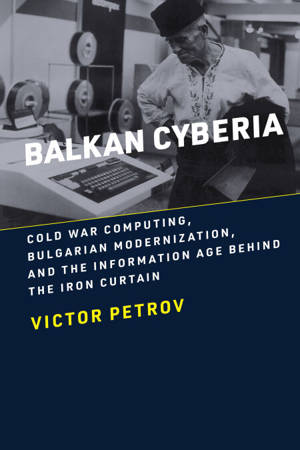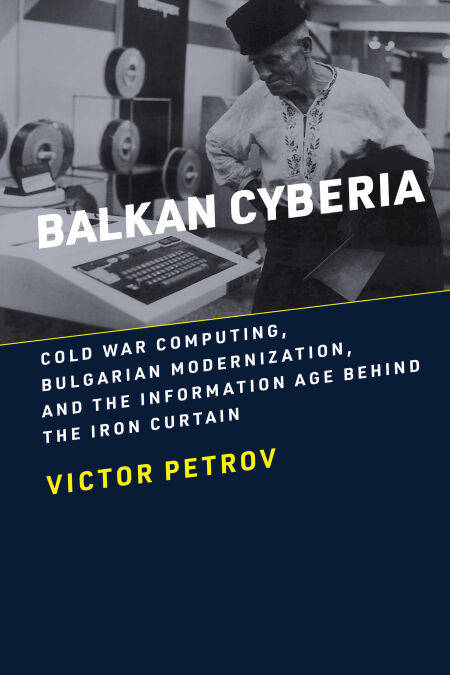
- Retrait gratuit dans votre magasin Club
- 7.000.000 titres dans notre catalogue
- Payer en toute sécurité
- Toujours un magasin près de chez vous
- Retrait gratuit dans votre magasin Club
- 7.000.0000 titres dans notre catalogue
- Payer en toute sécurité
- Toujours un magasin près de chez vous
Balkan Cyberia EBOOK
Cold War Computing, Bulgarian Modernization, and the Information Age behind the Iron Curtain
Victor Petrov
Ebook | Anglais
59,14 €
+ 59 points
Description
How Bulgaria transformed the computer industry behind the Iron Curtain—and the consequences of that transformation for a society that dreamt of a brighter future.
Bulgaria in 1963 was a communist country led by a centralized party trying to navigate a multinational Cold War. The state needed money, and it sought prestige. By cultivating a burgeoning computer industry, Bulgaria achieved both but at great cost to the established order. In Balkan Cyberia, Victor Petrov elevates a deeply researched, local story of ambition into an essential history of global innovation, ideological conflict, and exchange.
Granted tremendous freedom by the Politburo and backed by a concerted state secret intelligence effort, a new, privileged class of technical intellectuals and managers rose to prominence in Bulgaria in the 1960s. Plugged in to transnational business and professional networks, they strove to realize the party’s radical dreams of utopian automation, and Bulgaria would come to manufacture up to half of the Eastern Bloc’s electronics. Yet, as Petrov shows, the export-oriented nature of the industry also led to the disruption of party rule. Technicians, now thinking with and through computers, began to recast the dominant intellectual discourse within a framework of reform, while technocratic managers translated their newfound political clout into economic power that served them well before and after the revolutions of 1989.
Balkan Cyberia reveals the extension of economic and political networks of influence far past the reputed fall of communism, along with the pivotal role small countries played in geopolitical games at the time. Through the prism of the Bulgarian computer industry, the true nature of the socialist international economy, and indeed the links between capitalism and communism, emerge.
Bulgaria in 1963 was a communist country led by a centralized party trying to navigate a multinational Cold War. The state needed money, and it sought prestige. By cultivating a burgeoning computer industry, Bulgaria achieved both but at great cost to the established order. In Balkan Cyberia, Victor Petrov elevates a deeply researched, local story of ambition into an essential history of global innovation, ideological conflict, and exchange.
Granted tremendous freedom by the Politburo and backed by a concerted state secret intelligence effort, a new, privileged class of technical intellectuals and managers rose to prominence in Bulgaria in the 1960s. Plugged in to transnational business and professional networks, they strove to realize the party’s radical dreams of utopian automation, and Bulgaria would come to manufacture up to half of the Eastern Bloc’s electronics. Yet, as Petrov shows, the export-oriented nature of the industry also led to the disruption of party rule. Technicians, now thinking with and through computers, began to recast the dominant intellectual discourse within a framework of reform, while technocratic managers translated their newfound political clout into economic power that served them well before and after the revolutions of 1989.
Balkan Cyberia reveals the extension of economic and political networks of influence far past the reputed fall of communism, along with the pivotal role small countries played in geopolitical games at the time. Through the prism of the Bulgarian computer industry, the true nature of the socialist international economy, and indeed the links between capitalism and communism, emerge.
Spécifications
Parties prenantes
- Auteur(s) :
- Editeur:
Contenu
- Nombre de pages :
- 424
- Langue:
- Anglais
Caractéristiques
- EAN:
- 9780262373258
- Date de parution :
- 12-06-23
- Format:
- Ebook
- Protection digitale:
- Adobe DRM
- Format numérique:
- ePub

Les avis
Nous publions uniquement les avis qui respectent les conditions requises. Consultez nos conditions pour les avis.






